Civilization 6 strategies - How to master the early game, mid-game and late game phases
Now you've got the basics, here's how to dominate each phase of your campaign.
The joy of this game, as with all previous entries in this series, is that there are multiple ways to play and a myriad of Civilization 6 strategies that you can take on your way to one of the many victory types.
Having consumed the various pages of this guide from essential tips and tricks to a detailed look at the Leaders and managing Districts, you are well placed to strike out on your own and lead your Civilization to glory.
That said, forewarned is most certainly forearmed and we have so much more to give. So, whether you're hungry for solid starting strategies, wondering how best to rule your population in the mid game or looking for that late game push, we have you covered with some strong plays at each of the three main phases of play.
A quick note: we've refreshed out Civ 6 guides for the game's launch on Nintendo Switch, but just be aware that they contain information regarding the Rise and Fall DLC as well as the base game, which means some things only apply if you have that DLC! Otherwise... crack on!
Early game strategies in Civilization 6 to get off to the best start
The theme of Civilization 6 is the Age of Exploration and that should give you a very big clue as to what the most important early tactics revolve around. Before you get to pushing out at the edges of the fog of war, though, you'll need to found your first city.
If your settler starts next to a river, there's very little reason to move anywhere before founding that city as access to fresh water is the single most important factor early on due to the boost to housing that it provides and the resultant scope to grow your city. Outside of that, you're ideally looking for a nice mix of nearby terrain, with mountains being particularly beneficial for capitalising on the adjacency bonuses of the Holy Site and Campus districts, as well as providing a good natural defence against would be raiders.
City established, your first few build choices should be a scout, a slinger and a monument, which will give you options for exploration and a boost to your Civic research. Refrain from creating builders for now; with their ability to instantly create improvements there's no need to set them to work like there use to be with workers in previous Civ games and it will be a few turns before your population has grown to the point where you can make any real use of tile improvements.
What's more, creating tile improvements without a few basic troops to defend your land is just asking for a barbarian raiding party to come a knocking. With your scout, slinger and starting warrior, you can push out in different directions to assess where barbarian outposts may be. If you see a barbarian scout, don't dismiss it as harmless but instead hunt it down and kill it because it will report back to the nearest outpost and bring misery down on your fledgling civilization.
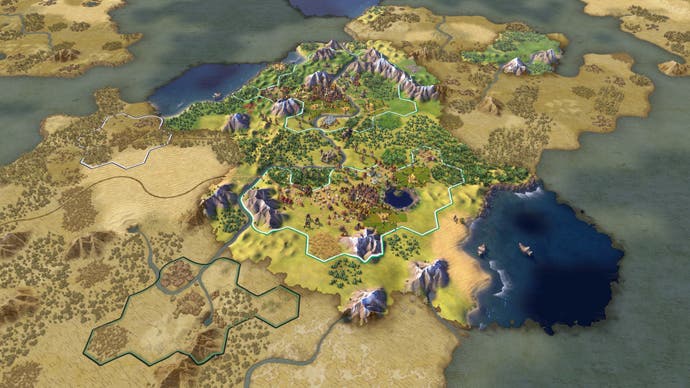
Depending on the map size, all of that exploration should lead to you encountering another civilization or at the very least a city-state. Early research of the Foreign Trade civic, and the creation of a trader, will enable you to capitalise on a lucrative trade opportunity; just be sure to keep track of the trader's route (they'll create a road as they travel back and forth) and ensure it's kept clear of barbarian threats.
Choose the Government Policies that make most sense to your current circumstances; Urban Planning for the extra production is always useful and if it's looking likely that you'll run into a few barbarians, plump for Discipline to boost your attack strength against them to help quash the threat before it turns into a menace.
With the first dozen or so turns under your belt down, you can look to create a builder to put to work the growing population of your first city and a settler soon after. Here, you can take a bit longer to establish where to build your next city, making use of the varied terrain but ensuring that you leave space around your city for districts and wonders, which each take up a tile space.
The early game of Civilization 6 is more flexible than previous entries in the series thanks to the many, varied bonuses enjoyed by leaders and civs alike, but three cities by turn 60-70 is a reasonable aim. Overall, take time to look at how best to leverage the bonuses conferred by your leader and civ, how they might be best boosted by Civic and Tech research and what you can do to boost the research that you're most keen on pursuing. Once you've established a plan of action and are working towards it with canny placement of districts and their associated buildings, you'll be well on your way to the mid game consolidation stage.
Mid-game strategies in Civilization 6
As you move into the mid game, around the time of the Renaissance Era, you'll have a decent foothold on your starting continent. Depending on the map you're playing and specific leader or civ bonuses, you might also have spread across the water with the Shipbuilding tech and perhaps even Cartography, which allows your units to enter ocean tiles. The focus here, as you move through the Renaissance and Industrial eras, will be on researching Technology and Civics that support your end goal.
Mid game government types support six policies that suit a range of priorities. Aim for a Monarchy government type, accessed via research of the Divine Right civic, to bolster your military; Theocracy (via Reformed Church civic) for a boost to religion; Merchant Republic (via Exploration civic) for a flexible government type that contains two wildcard policy slots and boosts gold acquisition through additional trade routes and discounts on purchasing.
Although the government system is flexible and allows for change, establish what you're looking to achieve and then stick with one government type to do so. This ensures that the government legacy bonus that builds up over time will be at its most powerful as you move toward the late game.
The policies that slot into these government types, on the other hand, are fair game and you should consider reviewing these regularly to ensure that they are best supporting your current priorities. If you've no plans to build military units for a while, switch from a military policy that bolsters unit production to one that reduces unit maintenance or makes unit upgrades cheaper. This can help turn those early game units into more formidable mid game troops.
Technology-wise, you should now have Military Engineering, which allows you to manually build roads using the Military Engineer unit. This is useful for connecting cities that have not seen a visit from a trader in the early game. If you're hemmed in on several sides by rival leaders jostling for position, there are a number of powerful mid game combat options, both offensively and defensively, to suit your mood.
Siege Tactics is an unexciting by excellent way to shore up your cities defence stats with Renaissance Walls and outlying forts. Military Science and Ballistics, meanwhile, can give you the edge on removing stubborn leaders who have settled cities too close to your borders for comfort.
By now, you'll also have a number of districts up and running in your cities and be eyeing up how best to maximise the bonuses they confer. Again, government type and policy choices can make a real difference here, but more important still is taking the time to think about how districts interact with one another and how they serve both your active goals and passive empire upkeep.
For most leaders, the neighbourhood district will come into its own around the latter part of the mid game and help prevent city growth from stalling. Just ensure you're keeping that burgeoning population happy with access to plenty of amenities as you move towards the all important final phase.
If your lust for Civilization 6 knowledge is still going strong, expansion owners should take a look at our Civ 6 Rise and Fall guide hub which takes you through the basics of everything new, whilst we have dedicated pages on Governors and Loyalty, along with how to earn Golden Ages, Era Points and Era Score through Historic Moments, and a full list of new Civs in Civ 6 Rise and Fall and other DLC. Otherwise, our Civilization 6 guide, tips and tricks covers the essentials before you master early game, mid-game and late-game strategies. We also have tips on the new Districts feature, a Leaders list with their Traits and Agendas, plus the best ways to get Gold, Science, and Faith, how to win by Religious Victory, and how to earn the elusive Science Victory and Military domination victory. Finally, here's the Culture Victory, Foreign Tourism, and Domestic Tourism explained in depth.
Late game strategies in Civilization 6
Devastating military units, astounding scientific breakthroughs, awe-inspiring religious wonders and must-see tourist hotspots characterise the late game in Civilization 6. If you've been working towards a Scientific Victory, the race is now on to research Rocketry for the dedicated Spaceport district it unlocks. Be aware of the any aggressive leaders who are already displeased or have been overtly threatening up to this point. The military units that the late game brings, not to mention the threat of nuclear warfare, casts a long shadow over attempts at more peaceful victory types and so a Defensive Pact with a trustworthy leader is a useful deterrent to would-be warmongers.
Even so, the Information Era end of the Technology Tree is filled with weapons of mass destruction and so, regardless of your end goal, it pays to create some powerful defensive units. It may instigate an arms race, but at least you'll be out of the blocks with an air fighter and heavy cavalry or two instead of left standing holding the starting pistol and firing blanks.
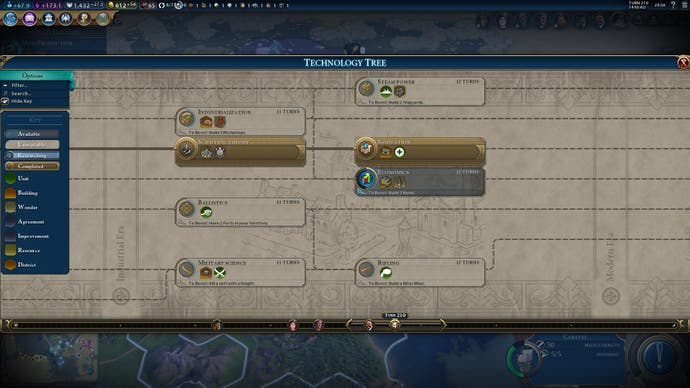
If you've been hedging your bets up to now regarding victory conditions (a dangerous way to play, to be sure) now is the time to pick a path and go full speed along it. There are enough adaptable policies, powerful district bonuses and end game civics to allow you to make up lost ground on a leader but a last minute change of plan is always going to struggle to compete with a well prepared foe who has been planning a Cultural Victory for the last couple of thousand years.
That said, flooding the world map with religious speakers to try to convert cities en masse and rush a religion victory has been shown to work, as they can move unhindered through territory and stopped only by rival religious units or an act of outright war.
The ultimate goal for a successful Cultural Victory is to reach the end of the Information Civics Trees as soon as possible. There, you'll find the civic that establishes and utilises the ubiquity of Social Media, which grants access to the Online Communities economic policy to provide an outrageously useful +50% boost to Tourism to civilizations to which you have a trade route.
What's more, if nobody seems to be grasping the initiative in any one victory condition, both Social Media and Globalization can be researched multiple times to help eke out a Score Victory.
Still, we're certain that you'll have utilised all of the many tips and hints in these guide pages to have been organised enough to win in some other way but, if not, a win is still a win and you'll have learnt an awful lot along the way, ready for the next time through. In the meantime, can we tempt you to take just one more turn?
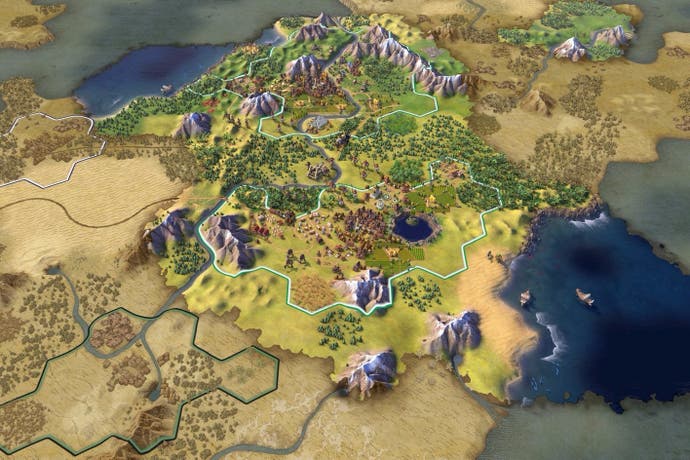




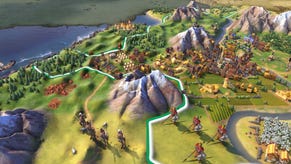


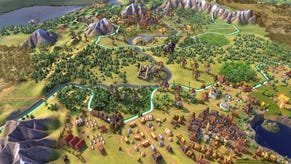

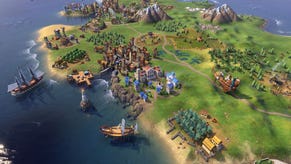






.jpg?width=291&height=164&fit=crop&quality=80&format=jpg&auto=webp)
